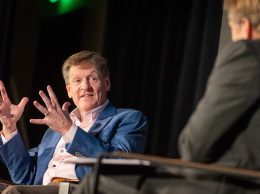Editorial: The perils of losing faith in the American Dream
Last week, something quite strange happened. A book about economics ousted a book about finance from the Top Seller spot on Amazon.com, territory more often reserved for shades of gray, boy wizards or dystopian teen sagas.
In the business world, of course, Michael Lewis’ “Flash Boys: A Wall Street Revolt” and Thomas Piketty’s “Capital in the Twenty-First Century” have been hot topics. They’ve inspired a vigorous debate about the implications of high-frequency trading for the financial markets and the impact of wealth distribution on economic growth. New trading regulations and the specter of a global wealth tax are suddenly blips on the radar screen.
It’s worth taking a step back to understand why these books have captured the attention of policymakers and the reading public — and why we can’t ignore them.
“Flash Boys” examines what Lewis claims is a high-tech front-running scam. By strategically placing their servers near different exchanges, high-frequency traders can snap up shares before hedge funds and pension managers can fulfill big orders. The results are billions of dollars in unproductive taxes on every retirement fund in the nation. The Securities and Exchange Commission is now examining the issue.
“Capital in the 21st Century” claims to show that the post-war period of relative wealth equality — and the American middle-class as we know it — was a historical aberration. When the return on capital exceeds economic growth for long periods, the story goes, wealth concentrates at the top and forms a feedback loop leading to an Old Europe-style rentier economy. Piketty proposes a global wealth tax to break the cycle.
When you cut through it all, these books give an articulate voice to inchoate feelings so many average Americans already harbor: The game is rigged, and the rich just keep getting richer. Hard work doesn’t pay, but having the right parents does.
Whether these beliefs are true doesn’t matter. It’s the belief, if not always the fact, that effort, merit and competition lead to wealth that has made America what it is. As Financial Times columnist Gillian Tett put it, “a dream does not necessarily need to be ‘real’ for it work as a social glue; all that is necessary is for enough people to believe in the illusion.”
America is dangerously close to losing the faith. We don’t agree with some of the policy prescriptions put forth in these books. But we can’t ignore them. If everyday Americans come to believe the game is fixed against them, they will call for even more radical changes that make trading restrictions and wealth taxes look timid by comparison.











